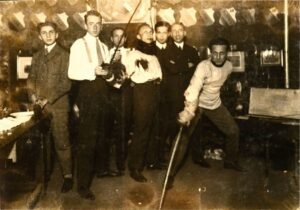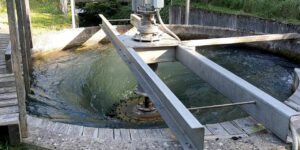Bioeconomy deals with the question of how the economy can be shaped in a holistic, environmentally conscious manner. A common problem: far too often recycable waste is not being used further. Bioeconomy entrepreneurs like Gunter Pauli are trying to close these broken cycles.
Entrepreneur Gunter Pauli presented two examples at the Technology Talks of the Forum Alpbach: Humus, which is obtained from baby diapers, and plastics made from weed.
The concept is not only concerned with replacing fossil or non-renewable raw materials, but with creating a closed economic cycle – from the raw material to the processed product, to the waste product, which is being recycled and in turn is intended to secure the supply of new raw materials.
“Bioeconomy is the production and use of biological knowledge for products, processes and services in all economic sectors,” says Joachim von Braun, head of the German Bioeconomy Council, explaining the concept. The goal is a “biologisation of economics”, the scientist says. For a soon to be reached “world population of nine billion who eat like twelve billion”, bioeconomy is the solution, he concludes.
Numerous countries have already drawn up bioeconomy strategies and are pursuing them. Austria is currently working on its own charter.
Full diapers as cash cows
Among the speakers was Gunter Pauli, an entrepreneur who began his “green career” with the takeover of an eco-detergent factory in the 1990s, worked on the Kyoto Protocol and is the founder of the Blue Economy. Pauli is always talking about – sometimes bizarre – bio-economic innovations. These are often projects in which products are made from almost free raw materials or waste. He advises and supports numerous companies and start-ups that work in bioeconomy.
Among them is a Berlin start-up that wants to turn the contents of baby diapers into money. More precisely, to Terra preta. This raw material is essential for the formation of valuable humus. “Berlin no longer has any landfills,” says Pauli. And diapers in particular would make up a not insignificant portion of the waste in Berlin. However, regular disposal of diapers via household waste isn’t a closed cycle.
With terra preta and humus made from children’s excrements, fruit trees could in turn be planted on the valuable resource. The fruits harvested from these planted trees, could be made into baby food or juice, and one would have a closed cycle, the start-up explains on its website. One child could help produce 33 liters of valuable humus soil per month that could be sold. The own child becomes thus quasi a cash cow.
Polymers from weeds, paper from stone
“You almost destroyed the petrochemical industry in Italy,” a forum visitor accuses the entrepreneur after his presentation in Alpbach. Pauli has bought up six oil refineries in Italy, all of them are to be converted into bio-refineries. Instead of crude oil, only renewable raw materials are to be processed. Pauli contradicts the visitor’s accusation. He explains, that he is working together with an Italian oil company. One of the acquired refineries is located in Sardinia and has been in operation again for a year – but now it’s “bio”.
Technologiegesprächen Alpbach 2015
(ORF/Hans Leitner)
Pauli’s priority in production is to work with local raw materials. In Sardinia he uses a weed: the thistle. In the refinery, thistles are now being used to produce bio-polymers for plastic production. The thistle waste is used as animal food and the enzymes produced during refinery are used for the production of sheep’s cheese, he explains.
“It used to take two million tons of petroleum to produce 700,000 tons of chemical products. We use 360,000 tons of thistles and get 358,000 tons of products,” the eccentric entrepreneur calculates. The only loss is made in the water that evaporates from the plants.
Speaking of water: in some regions in China, water is scarce already. This is why local authorities brought the eco-entrepreneur on board. In recent years, he helped to construct two factories in Taiwan and mainland China that produce so-called “rock paper” from mining waste. “The production gets by without a drop of water,” Pauli claims. Another advantage of rock paper is that it can be recycled over and over again.
“Bureaucracy hinders innovation”
Gunter Pauli often emphasizes the ethics of his projects. However, he does not see a contradiction in realising projects in autocracies. Most of the time he gets his projects off the ground faster there than in democracies. He sees crises – such as the water shortage in China – as an opportunity, and uses them. In his eyes it is not at all unethical to build factories in China. In fact, he thinks that “the lack of water there is unethical. Therefore we must intervene. In Europe, you just need more time for a project like that.”
Only three of his 200 or so projects are located in Europe, Pauli complains, adding that in Europe every proposed project must first pass bureaucratic reviewing processes. “In China they have no water. I am building the paper mill that produces paper without water. In Europe, you first do a feasibility study,” the entrepreneur sighs.
For Pauli, overly strict standards hinder innovation. We need “decisions by visionaries. Therefore, Pauli hopes “that Europe will soon have visionary politicians again” in order to speed up sustainable economic activity. He describes himself as a “Ché Guevara in a tie” who wants to change the system fundamentally and sustainably. He sees himself “as an optimist” and emphasises that he believed in true change. “My weapons are corporations.”
Published on August 31st 2015 on science.ORF.at


